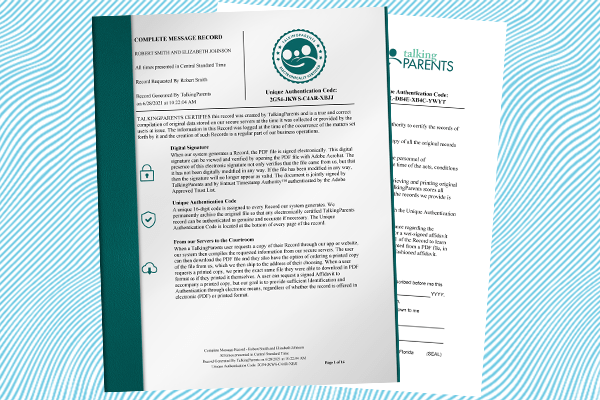Combating Harassment from Your Co-Parent
What constitutes harassment, how to identify it in your co-parenting situation, and why it’s important to counter.
- 5 min read
- divorce
- health & wellness

Even after an amicable divorce or separation, co-parenting successfully can feel like an uphill battle at times. For some, shared parenting can be a more difficult process due to conflict with a high-conflict co-parent. In some situations, a parent may experience harassment from their co-parent that can affect their physical and mental well-being. What many co-parents do not realize is that harassment is technically considered domestic violence and can have a significantly detrimental impact.
According to the U.S. Department of Justice, domestic violence is defined as “a pattern of abusive behavior in any relationship that is used by one partner to gain or maintain power and control over another intimate partner.” For co-parents, the close nature of shared parenting can enable one parent to harass the other for matters both related and unrelated to their child.
What are common forms of harassment?
The Department of Justice describes harassment as “any behaviors that intimidate, manipulate, humiliate, isolate, frighten, terrorize, coerce, threaten, blame, hurt, injure, or wound someone.” Even though the typical representation and perception of domestic violence usually involves physical forms, other common methods of harassment are:
- Verbal
- Emotional
- Financial
- Sexual
- Psychological
- Technological
Even though there isn’t a comprehensive, all-knowing description of what harassment looks like, there are plenty of common examples that can help co-parents recognize whether they’re being harassed. Some of the more typical forms of harassment that co-parents may experience are verbal, physical, and emotional.

What are examples of co-parenting harassment?
For co-parents, harassment may not seem like harassment at first. What starts as short, pointed comments can escalate as they compound. Your co-parent may be harassing you if they:
- Criticize your co-parenting choices
- Insult you verbally or digitally through texts or calls
- Refuse to work with you on co-parenting issues
- Leave voicemails or send messages excessively
- Interfere with parenting time by missing or being late to visitations or exchanges
- Make decisions about your child without talking to you
- Ignore your parenting plan or custody agreement
- Manipulate your child by alienating them from you
- Spread lies or rumors to others in your life
- Make claims about you being a bad parent
- Threaten to take you to court or seek full custody
There is no one-size-fits-all method to determine whether your co-parent is harassing you, but it is likely if you are experiencing one or a combination of these issues repeatedly for an extended period. No matter how helpless you may feel when your co-parent is harassing you, you do not have to endure this treatment.
How do I address harassment from my co-parent?
Regardless of how your co-parent harasses you, there are ways to combat their efforts, preserve your and your child’s well-being, and potentially seek legal assistance. If you are looking for ways to manage, stop, or prevent your co-parent from continuing to harass you, here are four techniques to implement as part of your efforts.

1. Keep everything documented
Regardless of whether you wish to pursue legal action now, you should document every interaction with your co-parent to collect potential evidence. When you must have conversations with your co-parent, stick to written communication methods like email and text messages. Save any instances of texts or emails with insults or accusations in a dedicated folder. If they repeatedly miss or show up late to visitations or custody exchanges, keep track of these parenting time failures in a document of exactly when these incidents occur.
An efficient way to keep all co-parenting interactions documented is by using a co-parenting communication service like TalkingParents. Every call, message, calendar adjustment, and other interaction within the service is documented on an Unalterable Record that both parents can access. The fact that everything is documented may deter your co-parent from continuing to harass you in texts or calls. If they persist, you have the evidence needed to provide accurate evidence to a lawyer or give a counselor a more comprehensive understanding of your situation.
2. Set boundaries for yourself
Although you cannot control how your co-parent treats you, you can always control how you respond. In situations where your co-parent is harassing you, they are often seeking to elicit an emotional reaction from you that fuels their efforts. Instead of giving in to anger, do your best to stick to a sensible approach in any interaction. Whether you choose the grey rock method or another communication model, stick to responses that are void of emotion and are focused on co-parenting matters. Avoiding emotional or irrelevant conversations deprives your co-parent of any potential evidence of you retaliating.
Once you choose and set your communication boundaries, write them down somewhere that you can reference them in difficult interactions. With TalkingParents, the Personal Journal gives each co-parent a private space to write and store whatever information they do not wish to share. Keep notes about your boundaries to remind you to be consistent, and use a journal entry to draft responses to your co-parent that follow your guidelines.

3. Seek outside support
Even on better days, dealing with harassment from your co-parent can take a significant toll on your well-being. Your first instinct may be to internalize your feelings and push through, but choosing to do this can be more damaging than helpful. Whether it’s a family member, friend, divorce coach, or a therapist, you should seek support from others in this difficult time. Working with a therapist or counselor can be especially helpful since they are more capable of providing unbiased advice, recommendations for managing conflict, and overall support.
Co-parenting harassment seldom affects the targeted parent alone–children can be negatively impacted by observing significant conflict between their parents. In witnessing interactions that could qualify as adverse childhood experiences (ACEs), children may deal with long-term effects such as:
- Anxiety
- Low self-esteem
- Poor performance in school
- Emotional or behavioral problems
- Issues with forming healthy relationships
- Post-traumatic stress disorder (PTSD) in severe, chronic cases
If your children exhibit any of these behaviors or issues, be sure to support them as well as you can. Journaling about what you and your child are experiencing can help take a snapshot of your experience and give a divorce coach, therapist, or counselor a better understanding of your situation. Facilitate therapy appointments for your child if they are especially affected by their other parent’s actions and words. Talk to your child to ensure they know they are loved and supported. Depending on the feedback from your or your child’s therapist, make notes about their advice to continue progressing between sessions.

4. Take legal action
Whether harassment from your co-parent has continued for a significant time or has escalated to a dangerous situation that impacts your and your child’s safety, consider taking legal action to protect yourself and your child. If harassment has persisted for a long time, you can seek a restraining or no-contact order to force space between you and your child’s other parent. If you’re working with a lawyer, another option is to draft and send a cease-and-desist letter. In cases where you and your child are in danger, contact law enforcement or local support groups for assistance.
Depending on where you live, different state laws may be in place to protect co-parents in situations of harassment or other forms of domestic violence. If you want to pursue any form of action, whether it’s a restraining order or a modification to your custody agreement, it is best to find a family law attorney in your area with successful experience in cases like yours. If you decide to pursue legal action, using TalkingParents can help you save thousands in attorney’s fees since Records automatically document all interactions within the service.
Enduring harassment from your co-parent can be extremely damaging to you and your child. Even if you are not initially concerned with occasional verbal remarks, harassment can build up quickly, affect your mental health, and even threaten your safety. It is crucial to recognize harassment and do everything you can to combat its effects to protect yourself and your child.